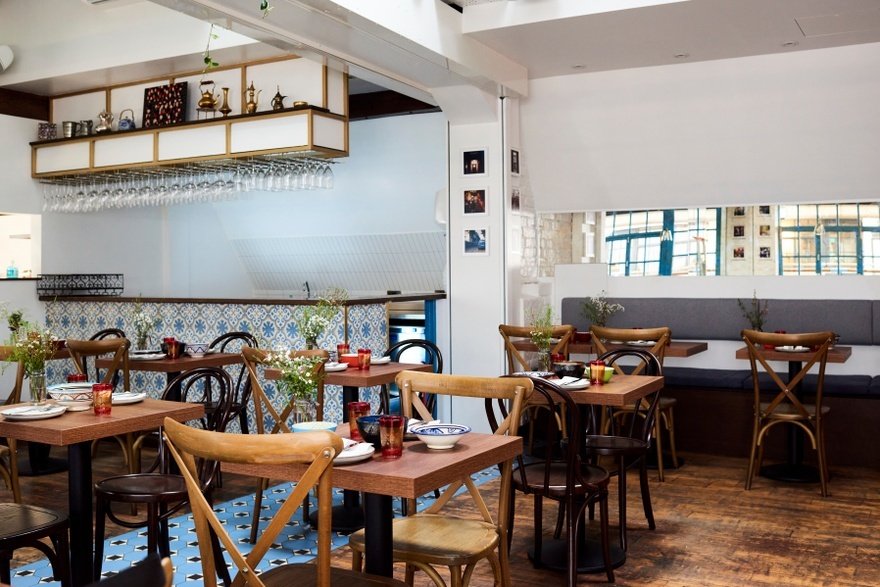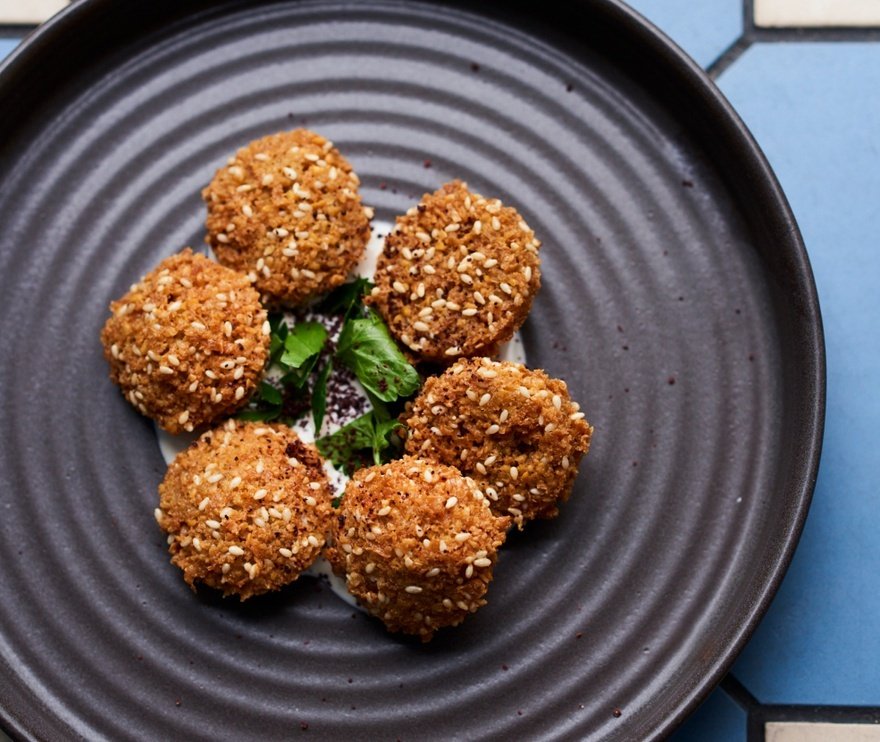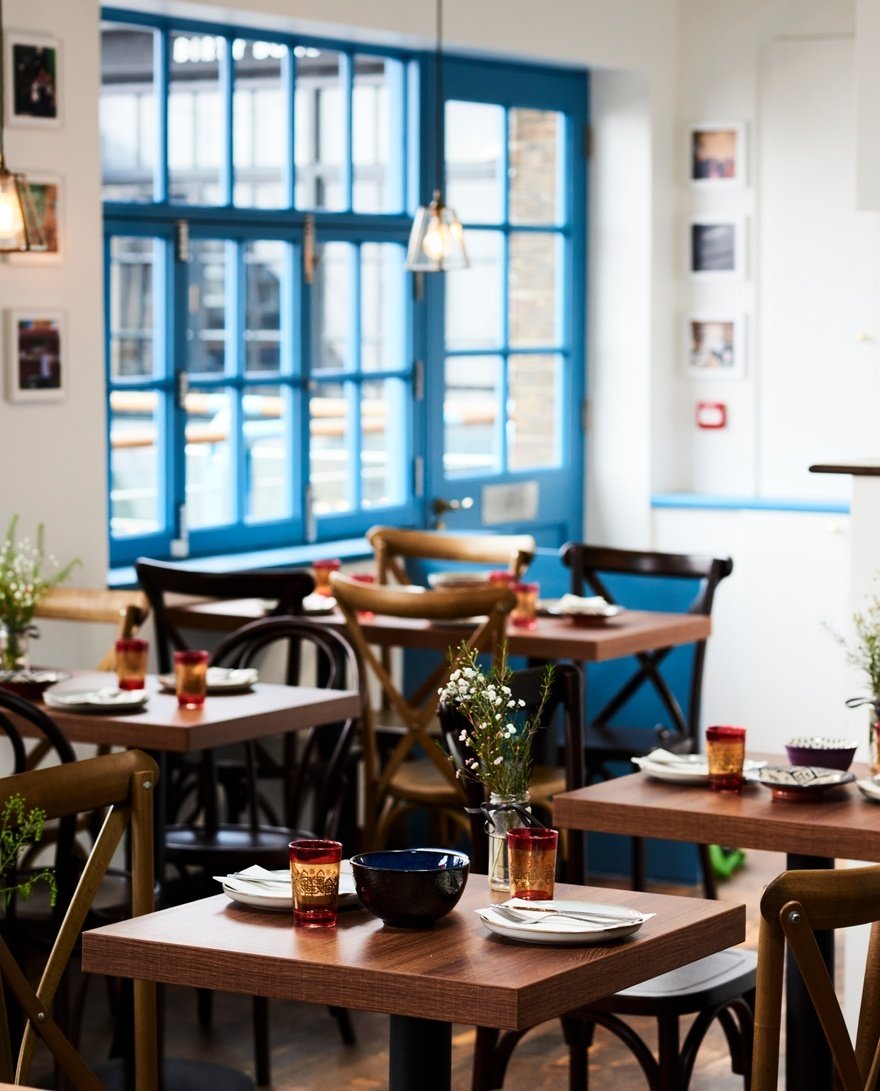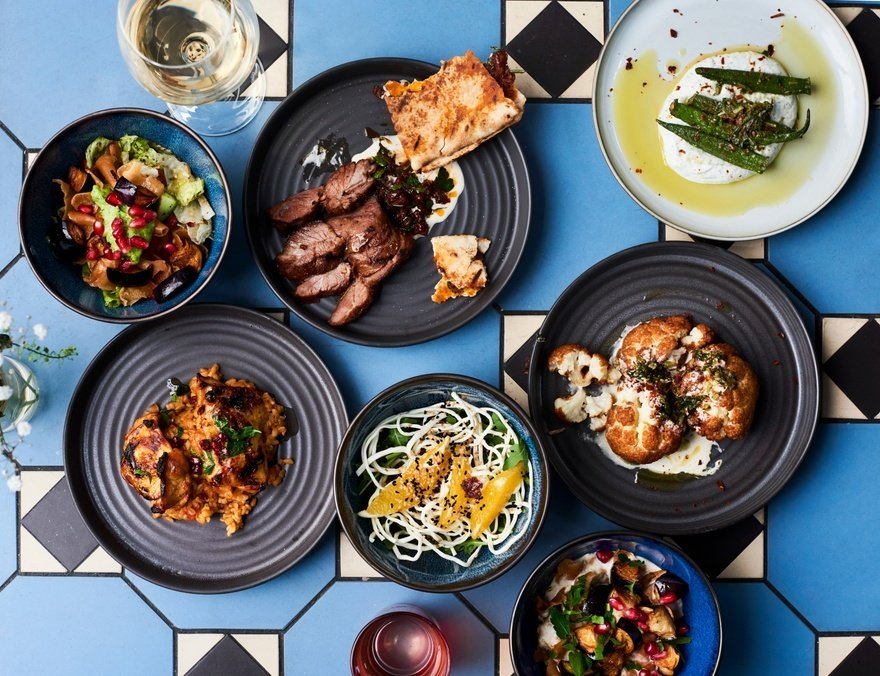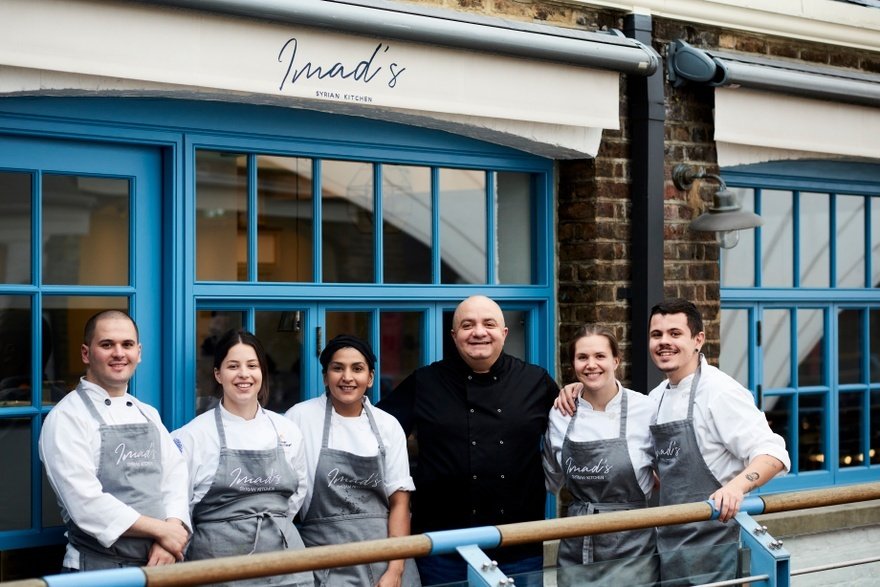Imad Alarnab on the road from Damascus to creating Imad's Syrian Kitchen
After losing his restaurants in his home country and fleeing from civil war, Imad Alarnab came to the UK to start over. Following a series of pop-ups and supper clubs, the Syrian entrepreneur is preparing to open his first restaurant in London. Katherine Price reports.
As 2020 draws to a close, we reflect on what has been an unbelievably hard year for the hospitality industry. The loss of jobs, businesses and even loved ones during this time have taken their toll in a way none of us could have imagined this time last year.
Imad Alarnab understands loss all too well. The former Syrian restaurateur lost all but one of his restaurants, juice bars and coffee shops in Damascus to civil war destruction in the space of six days. With his life in danger, he underwent a journey that involved traversing nine countries in two months and spending 64 days sleeping rough on the steps of a church in Calais. Then, 40 days after he arrived in the UK, far from home, his mother died. But his story, and his message to those in the industry, is one of hope and new beginnings as he prepares to finally open his first restaurant in London.
Alarnab did not set out to work in hospitality, although he was always into food. "It's very honoured to feed people for free in Syria, but not to feed them for money," he tells me over the phone in early December while arranging the final touches to the restaurant, just off Carnaby Street.
His first degree was in fashion design, but the family business "wasn't really my passion", he says. He subsequently studied business administration, "but it was really, really boring", he confesses. He opened his first restaurant in 1999 in Damascus' old city, followed by a second in 2006, and a third in 2009. His business also catered for events at several hotels in the city, the biggest of which was for 1,800 guests.
"It's not a big deal to have these big events in Syria because we come from really big families. For example, I have 14 uncles. In 1991 we stopped counting, but we were 98 cousins," he laughs.
However, in the space of six days in 2012, all his venues except one were destroyed. "Between 2012 and 2015 I had kind of given up. I didn't really believe in my future any more," he admits. Some of his workers were kidnapped or killed, and in 2014 he chose to close his last remaining restaurant. He worked odd jobs until 2015, when it became unsafe for him to remain in the country. He fled, forced to leave his wife and daughters behind. He and 54 others boarded a boat to Greece that was meant for nine people, and he then crossed the English Channel in the back of a lorry.
He came to the UK because he could speak English – his mother taught him as a child – and he wanted to be able to contribute and integrate. "To be able to work and be active in any society you need to at least communicate with the people," he says.
He was also motivated by his family, "I was looking for a better future for my daughters," he tells me. "They are really, really smart, really talented, and they deserved a better education and a much safer place to carry on their life."
The site
Alarnab started working as a car washer, working his way up to car salesman, and his family was able to join him in the UK one year later. He became involved as an adviser for the #CookForSyria initiative, helping raise money for Syrian children with Unicef's NEXTGeneration, and the plan was to eventually open his own restaurant. "Working in someone else's kitchen wasn't an option for me," he says.
In March 2017, he hosted his first Imad's Syrian Kitchen pop-up in east London's Columbia Road. The concept served simple mezze-style sharing platters and was run by Alarnab, his friends and fellow refugees.
Over the last three years he has hosted numerous pop-ups, charity events and supper clubs in Spain, Germany and France as well as the UK; catered for weddings and events; raised thousands of pounds for refugee charities such as Choose Love and a children's hospital in Aleppo; and saved money in the hope of eventually owning his own restaurant. During the pop-ups, he would put up signs that read: ‘free falafel if you are hungry and can't afford it'.
His describes his three-year search for the perfect site as "an absolute nightmare", as venues were often too big, not in the right location or too expensive. He was still running events and catering earlier this year when the coronavirus pandemic brought the hospitality industry to a halt, and he and his family were unfortunate enough to catch the virus. Thankfully, they have all recovered and have even been offering to pick up medication or shopping for people in their area.
In June, Darjeeling Express restaurateur Asma Khan announced she was moving her concept to a bigger venue and the site in Kingly Court was going to be available. Alarnab was already familiar with landlord Shaftesbury, having done three pop-ups in the investment trust's premises previously.
"Finding the right site was absolutely a dream come true," he enthuses. "They are really good friends of mine at Shaftesbury, all of them. I mean all of them. They've been really great from the very beginning. When I first saw the site, it was a little bit over my budget, but we worked it out together and they were really generous. They helped a lot, with everything. Even now they keep asking if I need anything, if they can do anything to help. They keep posting about it. Honestly, they've been great so far."
Most of the funding has come from the money he saved from doing pop-ups, and in October, he turned to crowdfunding for a final injection of £50,000 towards buying new fridges, falafel fryers, dishwashers, tables and chairs – a target of which he only fell £54 short.
He is incredibly humble and grateful for all the support he has had along the way, from refugee support volunteers to those who contributed to the crowdfund financially, and he is amazed that people from all over the world would want to give him money to achieve his dreams.
"I didn't know that I have followers from Germany or Canada or the US – it was a huge surprise," he explains. "When I received support messages from Austria, I didn't know what to say. It was an amazing feeling."
He says he will eventually donate the crowdfunded amount to Choose Love, with £1 from every bill going towards the charity once the restaurant is up and running, a cost that he is keen to stress will not be passed on to the customer.
The food
The 60-cover restaurant is down to 40 covers due to coronavirus restrictions, serving mezze sharing dishes using organic, seasonal produce for lunch and dinner. Sourcing ingredients hasn't been a problem, according to Alarnab: "This is the nice thing about London, you can find something from everywhere," he says.
He says five dishes should be enough for a meal for two, with dishes priced at just £4-£7 each. Of the starters, 90% will be vegan or vegetarian – not to accommodate trends or dietary requirements, but simply because that is the way he learned to cook and eat.
It will be a regularly changing menu with only around five main dishes, as Alarnab says he wants to keep the menu simple. He emphasises that his concept is a Syrian kitchen, serving the kind of food he and his family ate at home, rather than a Syrian restaurant.
"I'm not bringing Syrian cuisine to London; what I'm bringing is my Syrian home to London," he explains. "What we have on our menu is exactly the same as what my mother and grandmother used to cook for us. It's not something you find in restaurants in Damascus."
I'm not bringing Syrian cuisine to London; what I'm bringing is my Syrian home to London
He plans to be cooking in the kitchen himself, at least at the beginning, and has recruited a young team, most of whom have not worked with him before.
"We were very, very careful choosing our staff, because I believe your personality affects your cooking. Our team is from everywhere, from Syria, Iraq, Algeria, Bangladesh, Pakistan, England, Italy, Brazil. We have our own United Nations in our kitchen," he jokes.
He is full of enthusiasm for the city he now calls home, "What makes London a great city is the diversity," he says. "I don't have to change anything in me to be able to fit in. I'm not saying I didn't face problems, but the welcome can make you forgive and forget everything else."
What makes London a great city is the diversity. I don't have to change anything in me to be able to fit in
The future
Despite the incredible hardship he has faced and the obstacles he has overcome, including in the last few months, Alarnab is full of hope and positivity to finally be opening a restaurant again, even at such a difficult time for the industry.
"It means the world to me, to be honest, now it's happening," he says. He hopes to be able to open another site eventually, and also plans for the catering arm of the business to continue. He is even bullish about ‘challenging' the virus – his own experience of it seems to have propelled him to work even harder, and he speaks of working "as a community to have a better future", although he does hope the current situation will end soon.
When asked about what has driven him in the last 10 years to overcome so much loss, and if he has any advice for those who may have lost their jobs, businesses or loved ones this year, he is pensive: "I'm not the person to ask for advice for any of these people who lost people. They will have my empathy.
"I lost my mother 40 days after I arrived in the UK, and honestly, it was one of the biggest shocks in my life. I don't know how to give any advice on this. I lost her five years ago, and every other night I still wake up telling myself that I needed to call her, that she's going to ask me ‘why didn't you call me for a long time?'
"For any other reason, if it's not losing someone you love, or anyone in your life – a neighbour, a friend – besides this, if you lost money, lost a business, you can do it again. This is not lost. You did it the first time, it will be easier for you to build it the second time. Don't give up. Try again. Everything else you can make it again. The only loss is someone you love."
If you lost money, lost a business, you can do it again. This is not lost. You did it the first time, it will be easier for you to build it the second time. Don't give up
Imad's Syrian Kitchen: from the menu
- Fattet macdous (flatbread, baby aubergines, minced lamb, cumin)
- Falafel
- Hummus
- Baba Ghanoj (aubergine, tahini, black tahini, pomegranate seeds, thyme)
- Mtafayt Bamyeh (okra, coriander, labneh)
- Fattoush baitinjan (crispy flatbread, baby aubergines, cucumber, cherry tomatoes, lettuce, avocado, garlic)
- Za'atar salad (oranges, halloumi noodles, rocket, cherry tomatoes, za'atar, sumac)
- Zahrah Harra (cauliflower, tahini, coriander, jalapeño peppers, pomegranate seeds)
- Kabset riz (long rice, tomatoes, white onions, cloves, cinnamon)
All dishes, £4-£7
This feature was written prior to the announcement that Greater London was moving into Tier 3.
Photography: Issy Crocker
Continue reading
You need to be a premium member to view this. Subscribe from just 99p per week.
Already subscribed? Log In



